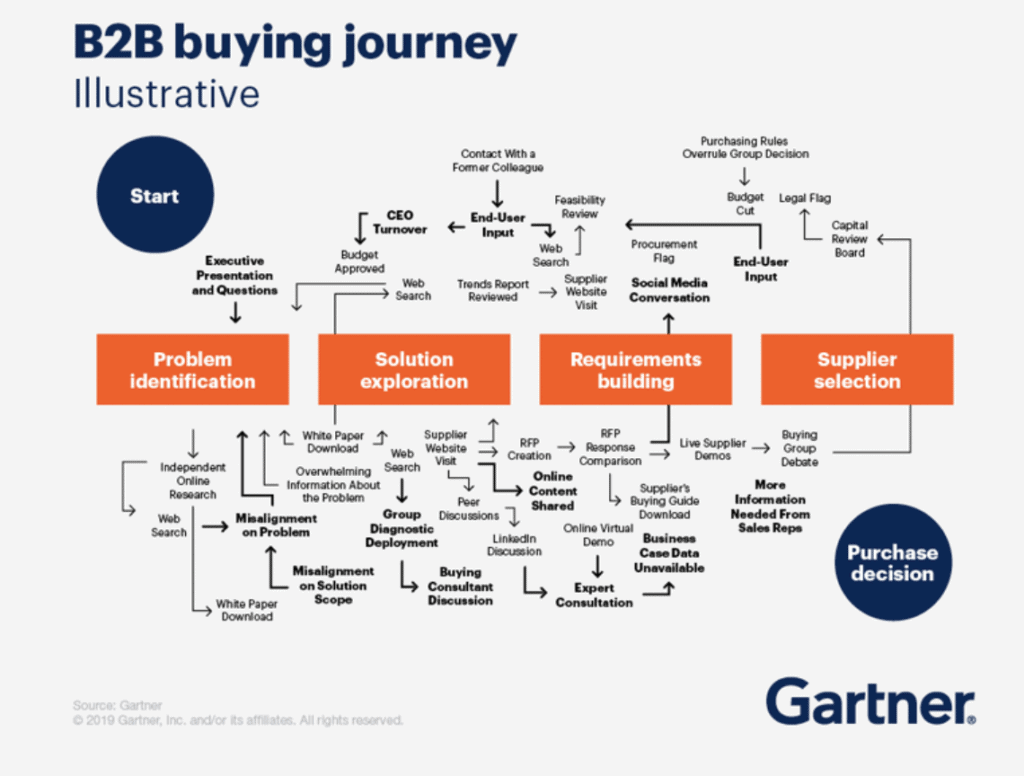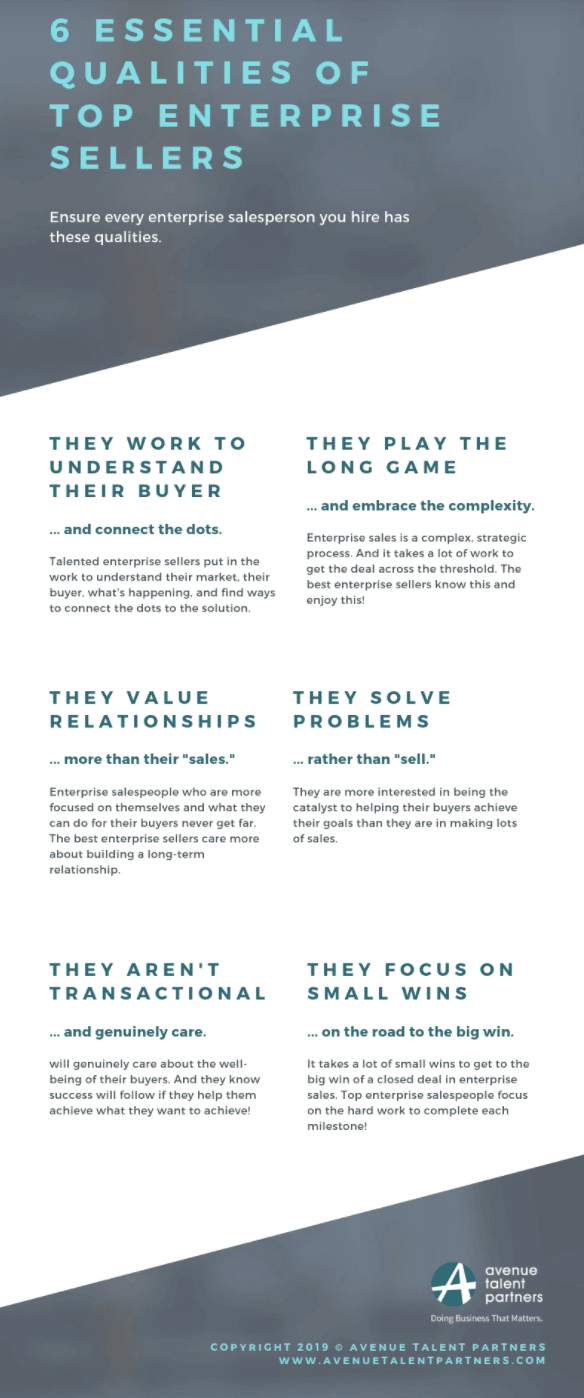
How to Build and Scale Enterprise Sales Teams from Scratch
I talked to a founder recently for an early stage startup with just a handful of clients and a recent round of seed funding.
The truth is, he’s sick of selling but doesn’t have a clear understanding of his marketplace, buyer, or an established sales process.
He tried to hire an enterprise sales rep to go after some of the biggest brands like Walmart, Target, Amazon, and Procter & Gamble.
That new hire wasn’t an enterprise salesperson, there was no onboarding process, they didn’t have a background in sales or Saas (but came from their industry), and the founder thought this was a terrific idea to save a few bucks.
Until it wasn’t and the person churned out within 8 months leaving behind a mess.
But there’s a bigger problem…
Before they can think about building a sales team to scale-up, they need to address the foundational problems of their startup first:
-
They’ve been shooting from the hip without a clear understanding of their TAM (total addressable market) and a non-existent sales process to boot.
-
The term CRM is like a foreign language.
-
Their approach to prospecting is hoping one cold call will turn into a customer without a solid sales strategy. The inside sales tactics don’t translate here.
-
They’ve made pivots based on assumptions.
-
They’re not clear on what a good salesperson for the enterprise market looks like.
-
And a shoddy hiring process for the cherry on top.
Despite all this, they came my way to “spin up” an enterprise sales team.
When your foundation is fractured, there’s no way you can build sustainably.
I get calls from founders, investors, and executives all the time saying their startup is enterprise-ready and it’s time to build a sales team to scale-up. They’ve got a killer product, great branding, a sales team, inbound leads, aggressive enterprise sales goals, and they’re eager to hit the ground running.
That’s all well and good, but doesn’t say anything about how prepared they are to make the jump.
You only get one shot at the enterprise market.
Rushing in head first without doing the legwork to prepare for the path forward is a recipe for disaster. Unfortunately, I’ve seen it time and time again.
Are you enterprise sales ready?
I know, I know… enterprise sales is sexy. That new business is lucrative and can net you top-tier logos with money to support your next funding round. But before you get caught up in the glamour of enterprise, it’s important to take a step back. Especially if you’re looking to build a sales team.
The enterprise market is complex.
This sales funnel is different. If you’re not ready to meet the multi-faceted needs of your buyers and new customers at every stage of their journey, you’re going to end up struggling.

SaaS sales is not a one-size-fits-all and developing an enterprise sales strategy is an entirely different beast.
You can’t just show enterprise buyers your product and expect them to sign on the dotted line. Far from it.
The KPIs are different and I’ve yet to see a product that was a perfect fit for an enterprise buyer without customization, gaining consensus across the business, or an intense security review process.
It takes new hires longer to ramp with more sophisticated and lengthy sales cycles, a true focus on customer success, many people involved in the buying journey, bigger deals, and a higher risk for buyers.

Developing Your Go-to-Market Sales Strategy
I’m a big fan of founder-led selling as a way of securing those first sales. Perception versus reality isn’t always the same thing.
Your first sales are priceless. Selling the first several accounts directly translates to a first-hand grasp of the work required to be successful that shapes what happens next. You’ll be tuned into the needs/wants/desires of your buyers.
Additionally, you’ll learn how long it actually takes to close a deal, the work required to get the deal done that shapes your sales process and hiring process, a grip on pricing, and an understanding of how your product fits (or not) in the grand scheme of things.
This is priceless knowledge to have BEFORE you start building an enterprise sales team. Once you have a repeatable sales process down with some proof in the pudding, then it’s time to start thinking about the hiring process to build out an enterprise sales team.
And you’ll be in a much better position to reduce the margin of retention error as a result. After all, how can you know who you need to hire if you don’t know exactly what needs to be done to succeed?
As a founder, it’s key that you understand the workflow of enterprise sales for your startup to enable your hires.
A big part of this is clearly defining your buyer:
-
Who benefits from what you do?
-
How many stakeholders are involved in the decision-making process?
-
What do your buyers require from you to make a decision?
-
What does customer success look like so we avoid a retention problem?
-
What metrics matter?
-
How can you help your buyers:
-
Solve problems?
-
Reach goals?
-
Get better?
-
The most successful sales process or hiring process = seeking to understand, NOT assume.
If you want to get it right, you have no choice, you MUST take an intentional approach to know where your buyers are versus where you hope that they’ll be.
There are no shortcuts to mastering enterprise sales.
Building Your Enterprise Sales Team
Good news, you’ve made it this far!
It’s time to start building your enterprise sales team.
Startup friends, make no mistake, the first year is a build year. Plan for at least 12 months to build a repeatable, scalable enterprise sales team.
I can’t stress this enough – make sure you have the runway and workflow to fully support your new sales team BEFORE you hire. They will need time to ramp (no matter how good they are or the rolodex they bring to the table), a solid foundation to build a strong pipeline for the short and long term, sales tools, and time to close these deals.
I live and die by the go slow to go fast later theory. Taking your time to create a people-centric, effective hiring process will feel heavy up front, but will allow you to streamline to go a heck of a lot faster later.
You do NOT want to adopt the wrong approach of hiring cohorts of account executives and waiting for the cream to rise to the top with a playbook for firing those that don’t pass muster. That’s a painful retention nightmare you want to avoid.
As my friend and wonderful sales leader, Jake Reni said:
“Sometimes we try to solve problems by throwing more bodies at it thinking if we just get more reps in the market and create more pipeline, we’re going to solve our problem. But in fact, our customer acquisition cost goes up. Then we run out of runway and before you know it, we have to lay off 40%-80% of our sales force.”
The playbook is simple. It’s about the right people, in the right roles, doing the right work. You’re looking for the best candidates for the specific job that you need done, NOT baseless templates that you may be tempted to force them into because that’s “how you SaaS.”
The selection criteria changes based on the growth stage of your startup, enterprise experience, market knowledge, workflow, and a whole slew of other factors when it comes to building a sales team that doesn’t have a retention crisis.
Once you pinpoint exactly what you’re looking for at your stage and the work required to succeed, you’ll be able to find the right enterprise salesperson to knock it out of the park for the long haul.
What to think about as you build your enterprise sales team:

It’s easy to get excited about candidates with a ton of enterprise experience, but you need to dig deeper than that.
These are some interview questions you can ask in your hiring process to get a keen sense of a candidate’s capabilities and how they’d fit within your enterprise sales team:
-
What’s important to you?
-
How do you think about strategic planning?
-
What does a follow-up look like in your process?
-
Do you prefer inbound versus outbound for your sales strategy and why?
-
How do you immerse yourself in a new industry?
-
What does sales operations mean to you?
-
How do you open doors to get a seat at the table and keep a seat at the table?
-
How do you think about your enterprise sales pipeline (short-term, mid-term, long-term)?
-
How do you prioritize your accounts?
-
What does customer success mean to you?
Above all, the best skill for any enterprise salesperson is the ability to listen. And no, I’m not talking about listening in objection handling. I’m talking about listening to understand to confirm or deny how you can help while crafting an action plan that hits the mark for your buyers not your sales funnel.
My strongest recommendation is leveraging the power of a hiring scorecard to avoid letting your perception cloud the reality of the situation. It’s far too easy to get caught up in the story you want to hear vs. the reality of what’s actually on the table in front of you.
A scorecard removes emotion while keeping your hiring process intentional and on point.
Final Thoughts
Jumping into enterprise sales to build a successful sales team is an exciting proposition for startups looking to scale-up, but not one to take lightly as a Founder. Buckle up, scrap the templates, and realize that there’s a whole lot of work before your first buyer signs on the dotted line.
To have sustainable success with a sales strategy that works, embrace the fact that this is a long game.
Patience is a virtue.
